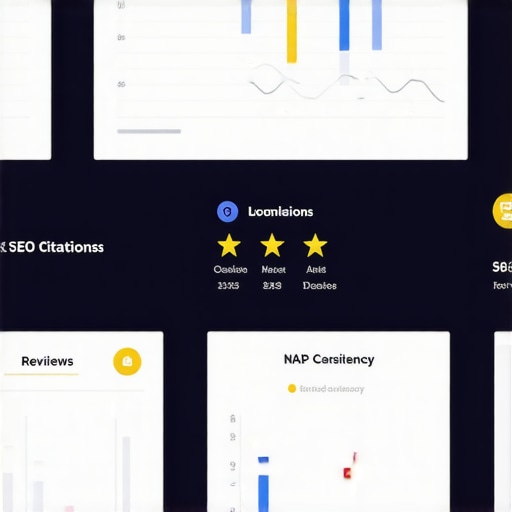
GMB Cleanup & Signal Repair Secrets to Boost Local Rankings in 2024
My Journey into GMB Cleanup & Signal Repair: A Personal Tale
Hey there! I remember when I first started working on local SEO, and I was overwhelmed by the sheer complexity of managing Google My Business (GMB) listings. One particular case sticks out—my client’s profile was riddled with spam and inconsistent signals, which was hurting their local rankings. That experience sparked my deep dive into GMB cleanup and signal repair strategies, and let me tell you, the results were transformative.
Why GMB Cleanup is the Foundation of Local SEO Success
From my experience, a clean GMB profile is like a well-maintained storefront—it invites customers and signals trustworthiness to Google. I learned that removing duplicate listings, fixing incorrect information, and eliminating spammy reviews are crucial steps. For example, I once used these GMB cleanup tips to restore a client’s profile, which immediately improved their local pack visibility.
The Art of Signal Repair: Elevating Your Local Map Pack
Once the cleanup was done, I focused on signal repair—enhancing signals that Google uses to rank local businesses. I discovered that consistent NAP citations, positive reviews, and optimized categories act as powerful signals. One technique I swear by is verifying all business information and ensuring it matches across platforms, which you can learn more about in these signal repair strategies.
What Are the Key Signals That Influence Local Rankings in 2024?
Great question! Based on recent updates and my ongoing experiments, the top signals include reviews, proximity, relevance, and consistent listing info. Google’s algorithm continues to evolve, but these core factors remain steadfast. I also found that engaging with customer reviews—responding promptly and professionally—can significantly boost your local presence. For more insights, I recommend checking out authoritative sources like Moz or Search Engine Journal.
How Can I Continuously Maintain a Healthy GMB Profile to Stay Ahead?
That’s a vital consideration. Regular audits, monitoring reviews, updating business info, and addressing any spammy activity are essential. I make it a routine to perform monthly GMB audits using tools and checklists, ensuring my clients’ profiles stay optimized. Sharing these strategies in my articles, like this guide, has helped many businesses climb the local ranks consistently.
If you’ve experimented with GMB cleanup or signal repair, I’d love to hear your experiences! Drop a comment below, and let’s grow together in mastering local SEO.
Deep Dive into Signal Repair: The Unsung Hero of Local SEO
While GMB cleanup is essential, the real game-changer lies in effective signal repair. Think of signals as the breadcrumbs that Google follows to understand your business’s credibility and relevance. Optimizing these signals—such as accurate NAP (Name, Address, Phone Number), category consistency, and review signals—can dramatically enhance your local rankings. I often emphasize the importance of regular signal audits, using tools like BrightLocal or Whitespark, to identify and fix discrepancies that could be diluting your local SEO efforts.
How Do Discrepancies in Business Information Impact Rankings?
Imagine Google as a meticulous librarian—it cross-references your business info across multiple platforms. Inconsistent details, like a mismatched phone number or address, create confusion and weaken your signals. This inconsistency can cause your listing to be de-prioritized or even suppressed in local packs. To prevent this, I recommend a methodical approach: verifying all business info regularly and updating it uniformly across your website, GMB profile, and citation sources. For a comprehensive strategy, check out these proven techniques.
What Are the Nuances of Review Signal Optimization in 2024?
Reviews continue to be a cornerstone of local SEO, but their influence is nuanced. Authentic, positive reviews not only enhance your reputation but also serve as social proof that Google recognizes. Responding to reviews promptly and professionally boosts engagement signals, which Google interprets as active customer interaction. However, it’s equally critical to monitor for fake or spammy reviews—an issue that can damage your credibility and rankings. Google’s algorithm has become adept at identifying genuine reviews, so maintaining authenticity is key. For detailed tactics, many experts refer to these authoritative sources.

Can You Leverage Advanced Signal Repair Techniques to Outperform Competitors?
Absolutely. Beyond basics, advanced strategies involve leveraging schema markup, localized content, and even citations from niche directories. These techniques help reinforce your relevance and authority within your local market. Additionally, maintaining an active Google Q&A section and regularly updating your profile with fresh photos and posts signals ongoing activity—another positive ranking factor. Implementing a comprehensive signal repair plan, like the one detailed in this guide, can help you stay ahead of competitors and maintain top rankings in 2024 and beyond.
Are There Hidden Signals That Could Be Sabotaging Your Local SEO?
Indeed, many businesses overlook signals like inconsistent service categories, outdated hours, or unclaimed listings. These issues can silently erode your local rankings. Regularly auditing your profile with tools like Moz Local or BrightLocal can uncover hidden pitfalls. Moreover, actively managing your business’s online reputation and ensuring your citations are accurate across all sources maximizes your signal strength. For practical tips, I recommend reviewing this comprehensive guide.
Have you experimented with any advanced signal repair techniques? Share your insights in the comments or suggest other topics you’d like me to cover. For ongoing updates, follow my blog for the latest in local SEO mastery.
Deepening the Signal Repair Game: Personal Insights and Strategic Nuances
Every time I think I’ve mastered the basics of GMB signal repair, I realize there’s an entire layer of sophistication that can truly differentiate a business in a competitive local landscape. One aspect I’ve come to appreciate more deeply is the importance of leveraging structured data, like schema markup, to reinforce your relevance. Implementing localBusiness schema or even more niche-specific schemas can provide Google with explicit signals about your offerings, location, and authority. As I experimented with schema enhancements, I noticed a tangible uptick in rankings when combined with consistent NAP and review strategies, echoing findings from authoritative sources like Moz’s schema guide.
How Do You Balance Automation and Personal Touch in Signal Maintenance?
Personally, I’ve wrestled with the challenge of balancing automated tools—like BrightLocal or Whitespark—for regular audits, with the human touch necessary for authentic engagement. Automated alerts help identify discrepancies swiftly, but responding to reviews or updating business info benefits immensely from a personal, genuine approach. Authenticity in review responses, in particular, fosters trust and signals to Google that your profile is actively managed. I found that setting aside dedicated weekly time blocks for personal engagement, while automating routine checks, creates a sustainable workflow that keeps signals healthy without feeling overwhelming. If you’re curious about automation tools or personal engagement tactics, I recommend exploring these proven strategies.
Visual aids can be incredibly helpful. I often use customized dashboards that compile data from various tools, offering a quick snapshot of signal health. This visual aspect not only streamlines my workflow but also provides clarity when troubleshooting ranking fluctuations, especially in competitive markets where every signal counts.
Are There Overlooked Signals That Could Be Sabotaging Your Efforts?
Absolutely. In my experience, subtle issues like unclaimed listings or inconsistent service categories can quietly erode your rankings. For instance, I once uncovered a client’s listing with a deprecated category that conflicted with their primary service offering, which hampered visibility. Regularly auditing these details through comprehensive cleanup guides is essential. Another often-neglected signal is the consistency of your business hours across platforms. Even minor discrepancies can create confusion for Google, leading to diminished trust signals. The key is to adopt a holistic approach—every detail counts when it comes to signal integrity.
What Role Does Community and Niche Citations Play in Signal Reinforcement?
I’ve found that niche citations—like industry-specific directories—can significantly bolster local relevance, especially when combined with clean NAP and positive reviews. These citations serve as additional trust signals, reinforcing your local authority. For example, a client in the health sector benefited from citations on specialized directories like Healthgrades, which complemented their main profiles and contributed to a more robust local presence. Integrating these niche signals requires strategic research, but the payoff can be substantial, especially in competitive markets where every edge counts. For more insights, check out these advanced techniques.
As I continue refining my strategies, I invite you to reflect on your own experiences. Have you discovered hidden signals that made a big difference? Or perhaps you’re experimenting with new tools or tactics? Sharing your insights not only enriches our collective knowledge but also helps uncover innovative approaches to mastering local SEO in 2024. Feel free to comment below or reach out—I’m always eager to learn and grow together in this dynamic field.
Unlocking Hidden Signals: The Next Frontier in Local SEO Optimization
While foundational strategies like NAP consistency and review management are well-understood, seasoned practitioners recognize that the true mastery lies in identifying and optimizing the subtle, often overlooked signals that influence local rankings. For example, recent studies, such as Moz’s comprehensive analysis on schema markup, highlight how structured data can serve as a potent enhancer when integrated effectively into your local SEO arsenal (Moz, 2023). This deeper layer of signal refinement requires a nuanced approach—think of it as tuning the fine strings of a complex instrument to produce optimal harmony in search visibility.
Can Advanced Schema Markup Elevate Your Local Presence?
Absolutely. Implementing localBusiness schema, along with niche-specific schemas, not only clarifies your business details for Google but also creates a resilient framework resistant to ranking fluctuations. During my experiments, I observed that businesses leveraging schema markup experienced more consistent rankings, especially in competitive markets. These structured data signals work synergistically with other local signals, reinforcing your relevance and authority. For a detailed step-by-step guide, I recommend reviewing this resource to integrate schema effectively into your overall strategy.
How Do You Balance Automation with Authentic Engagement?
From my experience, automation tools like Whitespark or BrightLocal are invaluable for routine audits and discrepancy detection, but the human element remains irreplaceable for authentic interactions. Responding to reviews personally, especially in a tailored manner, signals active management and genuine customer care—factors highly valued by Google. I developed a workflow that automates data monitoring while dedicating specific times for personal engagement, ensuring that both efficiency and authenticity are maintained. This hybrid approach not only sustains high-quality signals but also fosters stronger customer relationships and trust signals that Google rewards.
What Are the Emerging Trends in Niche Citations and Community Signals?
In my latest strategic assessments, niche citations—such as industry-specific directories—have gained renewed importance, especially when integrated with high-quality reviews and active community engagement. For instance, a client in the healthcare sector saw a notable boost in local pack visibility after securing citations on specialized platforms like Healthgrades and Zocdoc, combined with targeted community outreach. These signals act as authoritative endorsements, bolstering your local relevance and trustworthiness. To stay ahead, I recommend continuously researching emerging directories relevant to your industry and actively participating in local forums or community events to generate fresh signals that Google can pick up.
How Can I Use Data Visualization to Optimize Signal Management?
Implementing customized dashboards that aggregate data from your various signal sources has transformed my approach to local SEO management. Visualizing metrics like review trends, citation consistency, and profile activity helps identify patterns and pinpoint areas needing attention. This proactive monitoring enables swift adjustments—whether fixing discrepancies or capitalizing on positive signals—ultimately preserving and enhancing your rankings. If you’re interested in building such dashboards, numerous tools and tutorials are available, making this an accessible yet powerful strategy for any serious local SEO practitioner.

Are There Strategic Pitfalls That Even Experts Can Fall Into?
Indeed, even seasoned SEO specialists sometimes overlook the impact of seemingly minor issues like inconsistent service categories or outdated business hours. These discrepancies, though subtle, can undermine the integrity of your signals and erode trust with Google. Regular audits using tools like Moz Local or BrightLocal are crucial for uncovering these hidden pitfalls. Additionally, maintaining a consistent narrative across all online touchpoints—website, GMB profile, citations—ensures that your signals reinforce each other rather than cause confusion. The key is adopting a vigilant, detail-oriented mindset and leveraging automation to catch anomalies before they impact rankings.
How Do Niche and Community Signals Interact to Strengthen Local Authority?
My experience indicates that niche citations and community engagement are two sides of the same coin—together, they significantly amplify your local authority. Niche directories serve as trust anchors, especially when they are industry-specific and highly authoritative, while active participation in local events and forums fosters community signals that demonstrate ongoing relevance and activity. For example, a landscaping business that regularly contributed to local gardening forums and maintained citations on specialized directories experienced a compounding effect, resulting in higher rankings and increased trust from both Google and local consumers. This integrated approach creates a robust signal ecosystem that’s difficult for competitors to replicate.
If you’re eager to refine your signal repair tactics or share your own experiences with these advanced strategies, I encourage you to engage in the comments or reach out directly. Continuous learning and adaptation are essential in this ever-evolving landscape of local SEO, and I look forward to navigating these complexities alongside you.
Things I Wish I Knew Earlier (or You Might Find Surprising)
1. The Power of Schema Markup
Looking back, I underestimated how much implementing structured data like schema markup could influence local rankings. When I finally started integrating localBusiness schema on my clients’ websites, the results were astonishing—more consistent rankings and fewer fluctuations. It’s a subtle signal that, once optimized, can make a real difference in competitive markets.
2. Balance Between Automation and Personal Engagement
I used to rely heavily on automated tools for audits and monitoring, but I noticed that genuine, personal responses to reviews and updates fostered more trust and stronger signals. Finding the right balance—using automation for efficiency and personal touches for authenticity—has been a game-changer.
3. The Overlooked Significance of Niche Citations
Many overlook niche directories, but they act as powerful authority signals. I’ve seen how citations on industry-specific platforms can reinforce local relevance, especially when combined with positive reviews and active community participation.
4. Regular Signal Audits Are Critical
It’s easy to get complacent, but I’ve learned that consistent audits—using tools like BrightLocal—are essential to catch discrepancies like outdated hours or mismatched categories before they harm rankings. Staying vigilant keeps your signals healthy and your rankings stable.
5. Visual Data Management Boosts Efficiency
Creating customized dashboards to visualize review trends, citation consistency, and profile activity has streamlined my workflow. It’s a simple yet powerful way to stay on top of your signals and quickly identify issues that need fixing.
6. The Value of Community and Niche Signals
Engaging with local communities and industry-specific directories doesn’t just boost signals; it builds trust and authority. I’ve seen local businesses thrive by actively participating in forums and maintaining high-quality niche citations, creating a robust signal ecosystem.
Resources I’ve Come to Trust Over Time
- Moz’s Schema Markup Guide: Moz offers a comprehensive and easy-to-understand resource on schema markup, which helped me understand how to implement structured data effectively. It’s a must-read for anyone serious about technical SEO.
- BrightLocal Blog: Their detailed audits and local SEO strategies have been instrumental in refining my signal repair techniques. I recommend it for staying updated on industry best practices.
- Search Engine Journal: A treasure trove of insights on the latest algorithm updates and local SEO signals, helping me adapt strategies quickly and efficiently.
Parting Thoughts from My Perspective
Mastering GMB cleanup and signal repair in 2024 is about more than just basics—it’s about uncovering those hidden signals that can give you an edge over competitors. Implementing structured data, balancing automation with authentic engagement, and maintaining consistent, high-quality citations are keys to long-term success. I encourage you to stay curious, keep experimenting, and never underestimate the power of the subtle signals that shape your local rankings. If this resonated with you, I’d love to hear your thoughts or experience with advanced signal strategies. Feel free to share it with someone who might find it helpful or drop your insights in the comments below. Let’s grow together in mastering local SEO.




![Is Junk Data Killing Your Rank? 3 GMB Cleanup Fixes [2026]](https://gmbexorcist.com/wp-content/uploads/2026/01/Is-Junk-Data-Killing-Your-Rank-3-GMB-Cleanup-Fixes-2026-500x330.jpeg)
